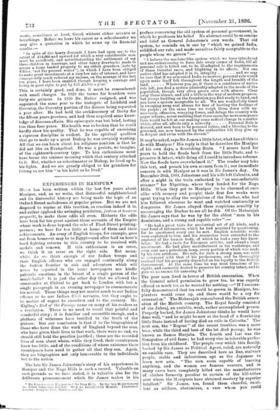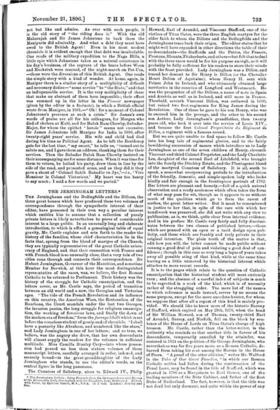EXPERIENCES IN MANIPUR.*
Mum has been written within the last few years about Manipur, and, as we write, that distressful neighbourhood and its distressful history are being made the topic of an Oxford Street melodrama at popular prices. But we are not disposed to repine at this reaction, as reaction indeed it is, and rather applaud the swinging pendulum, justunt et tenacern propositi, to make these odds all even. Hitherto the odds have been far too great against those servants of the Empire whose work is done beyond the echo of Fleet Street printing- presses ; we hear far too little at home of them and their achievements. An army of English troops, for example, goes out from home—it may be to Egypt—and after half an hour's hard fighting returns to this country to be received with medals and renown. If this enthusiasm is an error, we think it an error on the right side. But mean- while, do we think enough of our Indian troops and their English officers who are engaged continually along the Indian frontier in risk and adventure which will never be reported in the home newspapers nor kindle patriotic emotions in the breast of a single patron of the music-halls? It is just the other day that we allowed the commander at Chitral to get back to London with but a single paragraph in an evening newspaper to commemorate his arrival. These things may not matter much to our Indian officers or to our Indian Civil servants, but they ought to be matter of regret to ourselves and to the country. Mr. Kipling's End of the Passage came on many of his readers as a revelation. Theme is no need to recall that painful and wonderful story ; it is familiar and accessible enough, and a plethora of witnesses have testified to the truth of the picture. But our conclusion is that if to the biographies of those who have done the work of England beyond the seas, who have given their lives to that work, there were no end, we should still hold the practice justified ; these are the recorded lives of men about whom, while they lived, their countrymen knew too little, and of the conditions of whose existence their oountrymen have need to gather all that they can. Again, they are biographies not only honourable to the individuals but to the nation.
The late Sir James Johnstone's story of his experiences in Manipur and the Naga Hills is such a record. Valuable on such grounds as we have stated, it is valuable also for the deliberate pronouncement which Sir James makes in his
• My Eaveriinces in Manipur and the Naga Hilts. By the lase Major-General hie James Johnstone, K.O.S.I. Woh an Introdectory Memoir. Illustrated. LO(1,1011 Eutuvon Lox. Maratt n, mid Co.
preface concerning the old system of personal government, in which he professes his belief No abstract could be so concise and brief as General Johnstone's own words. That old system, he reminds us, is one by " which we gained India, solidified our rule, and made ourselves fairly acceptable to the people whom we govern ":—
" I believe the machine-like system which we have introduced and are endeavouring to force into every corner of India, till all personal rule is killed out, to be ill-adapted to the requirements of these Oriental races, and blighting in its effects. Not one
native chief has adopted it in its integrity and we may be sure that if we evacuated India to-morrow, personal rule would again make itself felt throughout the length and breadth of the
land Wherever you go, if there is a semblance of native rule left, you find a system admirably adapted to the needs of the population, though very often grown over with abuses. Clear away these abuses, and add a little in the way of modern progress, but always building on the foundation you find ready to hand, and you have a system acceptable to all. We are wonderfully timid in sweeping away real abuses for fear of hurting the feelings of the people ; at the same time we weigh them down with un- necessary, offensive, worrying forms, and deluge the country with paper returns, never realising that these cause far more annoyance than would be felt at our making some radical change in a matter
which, after all, affects only a minority Personal Rule is doomed, and men born to be personal rulers, and a blessing to the governed, are now harassed by the authorities till they give up in despair and swim with the stream."
It maybe asked, says Sir James a little later, what has all this to do with Manipur ? His reply is that he describes the Manipur of his own days, a flourishing State. " I strove hard for years to hold the floods back from the little State, and to preserve it intact, while doing all I could to introduce reforms. Now the floods have overwhelmed it." The reader may take this text, and preach his own sermon from it ; our immediate concern is with Manipur as it was in Sir James's day. On December 30th, 1884, Johnstone and his wife left Calcutta, and
after a night in the train embarked in "an uncomfortable steamer" for Nigriting, where they landed for the Naga Hills. When they got to Manipur (to be charmed at once alike with scenery and people) their first few weeks were spent trying to allay the suspicions of the Durbar, who had him followed wherever he went and watched continually as dangerous. Sir James allayed these suspicions sensibly by encouraging the Durbar to see all he did. Of the Maharajah Sir James says that he was by far the ablest "man in his dominions, and a strong and capable ruler "
" He had a great taste for mechanical art of all kinds, and a vast fund of information, which he had acquired by questioning, for he questioned every one he met. English scientific works were explained to him, and his researches were extended to tho anatomy of the human body, of which he had a very fair know- ledge. He had a taste for European articles, and owned a large assortment. He had glass manufactured in his workshops, and even sent me a petroleum lamp, every portion of which was made by his own artificers. His rule, for such a strong man, was mild as compared with that of his predecessors, and he thoroughly realised that his prosperity dependod on his loyalty to the British Government. At the same time he was most tenacious of his rights, and earnestly desired to preserve his country intact, and to give us no excuse for annexing it."
The poor man lived in terror of British annexation. When the General asked permission to grow tea, he was eagerly offered as much tea as he wanted for nothing :—" If I success- fully demonstrated that tea could be grown in Manipur, tea- planters would come up, and there would be a cry for annexation." The Maharajah remembered the British annex- ation of the Mattuk country. The Royal family consisted of the Jnbraj, an amiable, weak, rather accomplished person.
Properly backed, Sir James Johnstone thinks be would have done well, " and he might be now at the head of a flourishing little State instead of having died an exile in Calcutta." The next son, the " Regent " of the recent troubles, was a mere boor, while the third and best of the lot died young; he was known as Samos Hurjaba. The fourth and last was the Senaputtee of evil fame; he had every vice in tolerable perfec- tion from his childhood. The people over which this family, backed by Sir James as Political Agent, ruled, are naturally an amiable race. They are described here as fine, stalwart people, stable and industrious, apt as the Japanese to learn new arts. " The men seem capable of learning anything, and the women are famous weavers, and in many cases have completely killed out the manufacturers of clothes formerly peculiar to certain of the hill-tribes over whom the Manipuris have obtained mastery by superior intellect." Sir James, too, found them cheerful, excel- lent as soldiers, abstemious, a race whom you could
not but like and admire. As ever with such people, it is the old story of " the riding does it." With the old Maharajah and Sir James Johnstone to back them the Manipuris did admirably. And what a debt they must have owed to the British Agent ! Even in his most modest chronicle it is evident enough that that debt was incalculable. One reads of the military expedition to the Naga Hills, a little epic which Johnstone takes as a natural occurrence in his day's business, of the capture of the boats before Woon and Ruckstuh were rescued, of the night-march on Pot•17ra, —these were the diversions of this British Agent. One reads the simple story with a kind of wonder. At home, again, in Manipur there is a similar story of a multiplicity of difficult and necessary duties—" some service" to " the State," and that an indispensable service. It is the very multiplicity of these that make an abstract of them here impossible ; their effect was summed up in the letter in the Pioneer newspaper (given by the editor in a footnote), in which a British official wrote from Manipur, in 1891,—" Oh ! for a moment of Colonel Johnstone's presence at such a crisis." Sir James's own words of praise are all for his colleagues, for Morgan who died of cholera at Kul& and for Buluk Ram Chowby, Subadar- Major, for whom the epithet '• heroic " seems not excessive. Sir James Johnstone left Manipur for India in 1886, after twenty-eight years' service. His wife and child had died during his time as Political Agent. As he left the Residency gate for the last time, " my escort," he tells us, •' turned out to salute me, and I gave them an address, thanking them for their services. Then the Subadar Buluk Ram Chowby insisted on their accompanying me for some distance. When it was time for them to return, he halted his party, drew them in line by the side of the road, and presented arms, and as they did it they gave a shout of Colonel Sahib Bahadin to Jye,'—i.e., Vive Monsieur le Colonel Victorieux.' My heart was too heavy to say much ; I said a few words and we parted."























































 Previous page
Previous page